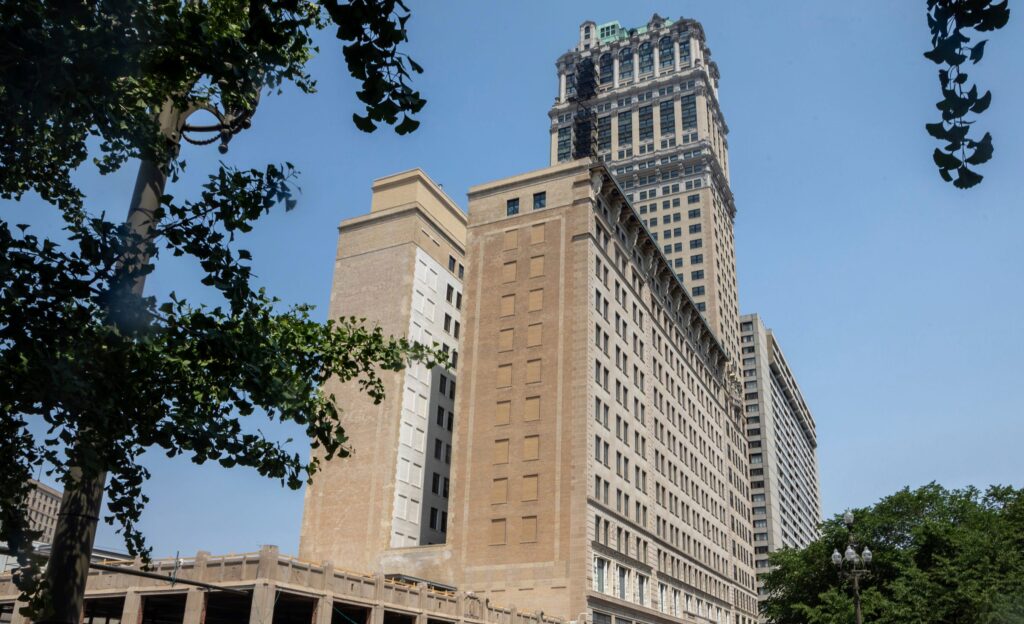
In response to a lawsuit filed by the Free Press and the Mackinac Center for Public Policy, the president of Bedrock has defended the use of taxpayer subsidies for its downtown Detroit projects. The lawsuit seeks the release of reports detailing the number of new employees and businesses benefitting from substantial public funding, particularly at notable sites such as the Hudson’s building, the Book Tower, and One Campus Martius.
In a recent opinion piece, JC Reindl of the Free Press outlined the ongoing legal battle with the Michigan Department of Treasury regarding information related to Bedrock’s Transformational Brownfield Plan. While Bedrock maintains that it has no official position on the legal proceedings and only learned of the issue through media coverage, the company acknowledges the importance of taxpayer confidentiality upheld by governmental authorities.
Jared Fleisher, Bedrock’s president, emphasized that the crux of the Free Press’ inquiry is based on the assumption that the new office spaces created under the brownfield plan have failed to attract new tenants and jobs. He argues that this premise overlooks the dramatic changes in the office market stemming from the COVID-19 pandemic.
According to JLL, a prominent real estate services company, national net leasing activity has been negative in 18 of the past 20 quarters, with approximately 1.1 billion square feet of office space currently unoccupied across the United States. Metro Detroit has faced similar challenges, experiencing a negative net absorption of 370,000 square feet of office space in the last quarter alone.
The pandemic has shifted workplace dynamics, leading to significant legislative changes regarding the brownfield program. Initially aimed at fostering new office jobs, the program was reformed in 2023 to support the development of vibrant mixed-use communities. Lawmakers recognized the necessity of transforming urban areas into multifaceted environments that include residential, retail, and recreational spaces.
In light of these adjustments, Bedrock submitted a public amendment to its Transformational Brownfield Plan in 2024, receiving approval in February. The revised plan focuses on diverse revenue sources beyond just office jobs, aligning with the state’s updated objectives. Fleisher highlighted that evaluating Bedrock’s projects against outdated office job estimates is misleading given the transformational nature of the current plan.
A key aspect of Bedrock’s involvement in Detroit is its substantial investment. The company is set to invest more than $2 billion in projects including Hudson’s Detroit, the Book Tower, and the One Campus Martius expansion. The estimated annual reimbursement from state taxes associated with these projects represents only 0.6% of this total investment, illustrating the potential for public-private partnerships to benefit the community.
These developments are expected to create hundreds of local jobs in hospitality, retail, and dining sectors, while also enhancing Detroit’s appeal as a tourist destination. Recognition from publications such as The New York Times and Travel + Leisure has positioned Detroit among the best places to visit, with the Book Tower highlighted as a significant attraction.
Fleisher also underscored the commitment of Bedrock’s founder and chairman, Dan Gilbert, who promotes a philosophy of prioritizing community impact over immediate profit. Gilbert recently remarked that profitability from projects like Hudson’s will take time, emphasizing a long-term vision for urban revitalization.
While acknowledging the role of the media in public discourse, Fleisher expressed confidence in the value of Bedrock’s projects and the strategic partnerships that have made them possible. He advocates for a continued focus on building a vibrant future for Detroit, stressing the positive economic impact these initiatives will have on the state.






